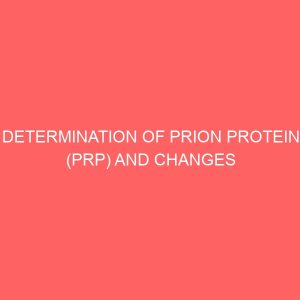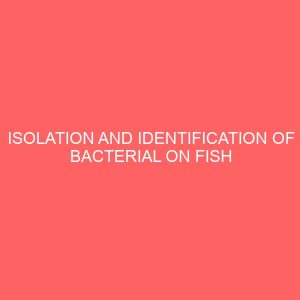Description
CHAPTER ONE
INTRODUCTION
This project is on Determination of prion protein (prp) and changes in fertility hormones with sleep deprivation in albino rats. Sleep is the natural state of bodily rest observed in mammals, birds, many reptiles, amphibians and fishes. It is equally a state of unconsciousness from which a person or animals can be aroused. In this state the brain is relatively more responsive to internal than external stimuli. In contrast, coma is also a state of unconsciousness from which a person or animals cannot be aroused (Max, 2006). Sleep is homeostatic; therefore it is controlled by the body’s internal balance (Max 2006). It is considered critical for maintenance of health, support of life, restoration of body and brain functions and promotion of neural-immune interaction (Aurell and Elqvist, 1985; Everson et al., 1989). These are reflected in the roles of sleep in the brain for memory co-ordination and teaching (Turner et al., 2007). Through its role in hormone activities such as in growth hormone, thyroid stimulating hormone and prolactin to mention a few, metabolic processes are properly co-coordinated and carbohydrate storages are carried out (Bonnet and Arand, 2003; Everson and Read, 1995).
Sleep deprivation, a general lack of necessary amount of sleep, which may occur as a result of sleep disorder or deliberate inducement or torture, is deleterious to health when it is prolonged. It has been scientifically observed that prolonged sleep deprivation may result in aching muscles, blurred vision, and clinical depression, and constipation, dark circles under the eyes, daytime drowsiness, and decrease mental activity and concentration, delirium, dizziness, fainting, hallucination, hand tremor, headache, hypertension, irritability, loss of appetite, memory lapses or loss, nausea, nystagmus, pallor, psychosis-like symptoms, severely yawning, sleep paralysis while awake, slowed reaction time, slowed wound healing, synaesthesia, temper tantrum in children, weakened immune system, weight loss, diabetes mellitus type II, obesity without weight gain and death (Gotlieb et al., 2005).
Prion protein pathologies are also associated with alteration in sleep. Rats inoculcated with brain homogenates from scrape infected animals demonstrated unusual spiking patterns in the electroencephagram (E.E.G) about four months after inoculation. During that period slow wave sleep (SWS) and active wakefulness are reduced while drowsiness is increased (Bassant et al., 1984; Bassant et al., 1986). In human, the condition known as fatal familiar insomnia is associated with prion disease related to thalamic neurodegeneration (Gibbs et al., 1980). Mutation in prion protein, a glycoprotein on neuronal membrane astrocytes, may underlie the pathological changes that accompany this condition (Monanri et al., 1994). Mice that genetically lack the prion protein gene demonstrated alterations in both sleep and circadian rhythms (Tobler et al., 1997). It has been demonstrated that neuronal cellular prion protein (PrPc) (but not non-neuronal) is involved in sleep homeostasis and sleep continuity (Manuel et al., 2007).
The main systemic disorder resulting from prolonged sleep deprivation in laboratory animals are negative energy balance, low thyroid hormones, and host defense impairment (Bergmann et al., 1989; Everson and Nowak, 2002). Prolactin, a lactating hormone and one of the anabolic hormones involved in sleep promoting activities was observed to be reduced during prolonged sleep deprivation (Vontruer et al., 1996).
Recent finding on the alterations in thyroid hormones in sleep deprived rats point to the brain as the essential site of sleep deprivation effects (Utiger, 1987). The hypothalamus and pituitary are the main sites of hormone production and regulation in the brain. Relatively, little is known regarding other neuro-endocrine consequences of sustained sleep deprivation and whether there is broad pituitary or hypothalamic involvement. It has also become necessary to survey the possibility of changes in the levels of some fertility hormones with sleep deprivation. The hormones of interest here are the follicle-stimulating hormone (FSH), luteinizing hormone (LH), ooestradiol, testosterone, Prolactin and thyroid-stimulating hormone (TSH).
Following the various relationships between sleep deprivation, prion protein (PrP) and hormones, it is necessary to explore the possible changes sleep deprivation may induce on PrP and some fertility hormones.
- Sleep
In animals, sleep is a naturally recurring state characterized by altered conciousness, relatively inhibited sensory activity, and inhibition of nearly all voluntary muscles. It is distinguished from wakefulness by a decreased ability to react to stimuli and it is more easily reversible than being in hibernation or a coma (Macmillian, 1981). Sleep is the natural state of bodily rest observed in mammals including humans. It is also observed in birds, many reptiles, amphibians and fishes. It is common to all mammals and birds. It is equally a state of unconsciousness from which a person or animal can be aroused. In this state, the brain is relatively more responsive to internal than external stimuli. The unconscious state of sleep is distinguished from that of coma by the fact that unconsciousness of coma in mammal or animal cannot be aroused (Max 2006; Ursin, 1983).
- Biology of Sleep
Sleep was thought to be a passive state but it is now known to be a dynamic process. It is homeostatic, therefore, it is controlled by the body’s internal balance. The brain is the seat of internal balance and it is active even during sleep. The brain is made up of parts and nerve centres that elicit nerve-signaling chemicals called neurotransmitters. The state of the brain activities during sleep and wakefulness results from activating and inhibiting forces that are generated within the brain. The neurotransmitters such as serotonin and norepinephrine of the brain control whether one sleeps or keeps awake by acting on the nerve cells or neurons in different parts of the brain as the need arises. The frontal lobe of the brain keeps the body awake. It is the centre of planning, the memory search, motor control and reasoning. The thalamus is for attention and sleep. The hypothalamus, located under the thalamus plays the role of promoting the type of sleep called slow wave sleep (SWS). The brain stem plays a great role in sleep and wakefulness. The brain stem is a set of neural structures at the base of the brain. It connects the brain to the spinal cord. It is made up of the medullar, the pons and the reticular formation. While the reticular formation helps to keep, the body awake and alert, the pons is involved in the sleep and control of facial muscles. The neurons at the brain stem actively cause sleep by inhibiting other parts of the brain that keep a person or animal awake (Sherwood, 1997).
- Regulation of Sleep
Sleep, one of the most sophisticated integrative functions in higher animals, appears to be regulated by the brain in conjunction with a variety of endogenous humoral factors. These factors are called sleep substances (Inoue, 1985). These substances are endogenous in the brain, cerebrospinal fluid and blood. These substances under the high physiological demand for sleep in the organism are produced in the brain stem and transferred to the whole brain via the body fluid (especially CSF) to induce or maintain sleep. These substances include peptides or protein, hormones and somnogens (Pappenleiner, 1975; Schoeneberger, 1977).
It is well known that growth hormones (GH) is secreted during delta sleep at first few periods of sleep cycle in humans (Gronfier et al., 1996). It equally plays a part in subsequent appearances of rapid eye movement (REM). Prostaglandin D2 (PGD2) has been revealed as one of the most promising candidates for an endogenous sleep substance. It induces slow wave sleep (SWS) in rats under restrained conditions (Obal, 2003). Adenosine, a purine nucleoside produced during nucleic acid metabolism and protein catabolism builds up in our blood when we are awake. At a level of accumulation, it stimulates drowsiness/sleep and break down gradually when we are asleep to enable restoration of wakefulness (Obal, 2003). Other substances such as emphetamines, caffeine, cocaine and crack cocaine, energy drinks and methylphenidate cause wakefulness (Abaraca et al., 2002). Wakefulness actually refers to a period of consciousness. The term consciousness therefore refers to subjective awareness of private inner world of one’s own mind, that is, awareness of thoughts, dreams and events. Maximum alertness depends on attention and getting sensory impute that energizes the reticular activity system (RAS) of the reticular formation of the brain stem and subsequently the activity level of the central nervous system (CNS) as a whole.
- Functions of Sleep
Sleep is considered critical for maintenance of health, support of life, restoration of body and brain functions and production of neural interaction (Aurell and Elqvist, 1985; Everson et al., 1989). These are reflected in the roles of sleep in the brain for memory consolidation and learning. Working memory is important. It keeps information active for further processing and support higher-level cognitive functions such as decision making, reasoning and episodic memory. These functions were shown to be affected by sleep deprivation in humans to a drop of about 38% in comparison to non-sleep deprived individuals (Turners et al., 2007).
Through its roles in hormonal activities, such as growth hormones, thyroid stimulating hormones and prolactin to mention but a few, metabolic processes are properly coordinated and carbohydrate storages are carried out (Bonnet and Arand, 2003; Bergmann et al, 1989 and Everson and Read, 1995). It has been shown that sleep, more specifically slow wave sleep, does affect growth hormone levels in adult men. During eight hours sleep it was found that the men with high percentage of SWS (average 24%) also had low growth hormone secretion while subjects with a low percentage SWS (average 9 %) had high growth hormone secretion. There are multiple arguments supporting the restorative functions of sleep. We are rested after sleeping and it is natural to assume that this is a basic purpose of sleep. The metabolic phase during sleep is anabolic and anabolic hormone such as growth hormones as mentioned earlier are secreted preferentially during sleep (van Cauter et al., 2000).
- Sleep Deprivation
Sleep deprivation is a general lack of the necessary amount of sleep. This may occur as a result of sleep disorders, active choice or deliberate inducement such as interrogation, for purposes of keeping watch for security reasons, prolonged study or research and some times for torture. During sleep deprivation there is a progressive increase in peripheral energy expenditure to nearly double normal levels, resulting to negative energy balance (Everson and Wahr, 1993). In response to this metabolic demand, an increase in serotonin and catecholamines act on both the frontal lobe of the brain stem to keep the body awake (NIH Pub, May 2007).







